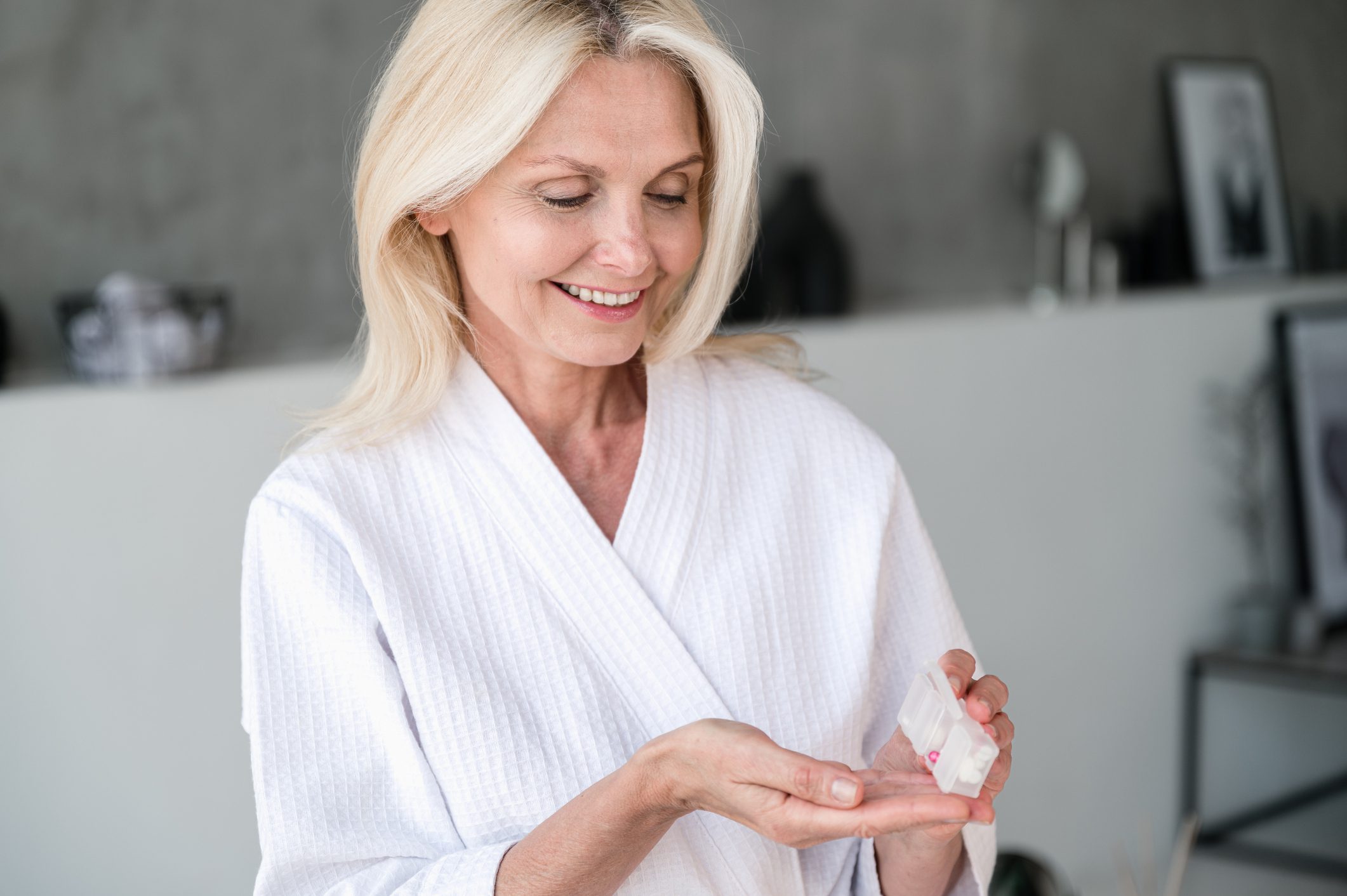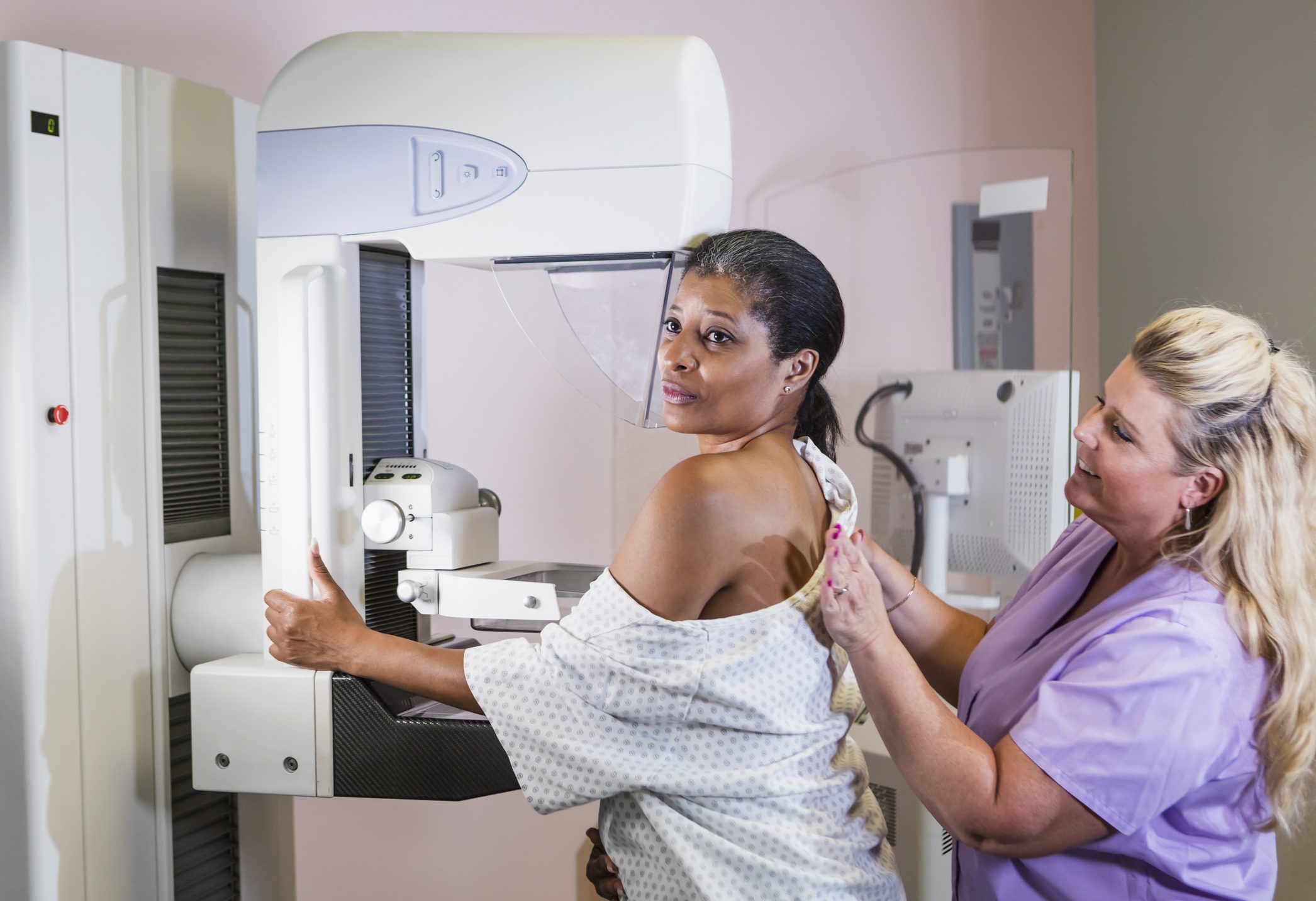Menopause typically hits around 50. The end of menstruation and reproductive years marks a major milestone in your life. But it’s not just about periods stopping. You may experience common symptoms like low libido, vaginal dryness, and discomfort during sex—these things matter, and they can profoundly impact your quality of life and emotional health.
Understanding these changes is the first step to maintaining a fulfilling sexual life, which you deserve to enjoy at any age.
What Causes Sexual Health Changes During Menopause?
Menopause brings significant hormonal changes that can affect sexual health. As estrogen, progesterone, and testosterone levels drop, you may notice changes in sex drive, vaginal health, and sexual responsiveness. These hormonal shifts are the main cause of many sexual health issues during menopause.1
Common symptoms include vaginal dryness, decreased libido, and painful sex, along with changes in orgasm, reduced sensitivity, urinary symptoms, and mood swings.2 Low sexual desire affects 40-55% of women during menopause, poor lubrication affects 25-30%, and painful intercourse impacts 12-45%.3
Emotional fluctuations during menopause can lead to feelings of sadness, anxiety, or depression, which can lower self-esteem and create tension in romantic relationships. This can make it harder to maintain a close emotional connection and can reduce physical intimacy, significantly impacting self-esteem and body image.4, 5
Additionally, societal taboos and stigma surrounding discussions of sexual health can make women feel uncomfortable or ashamed to talk about their experiences. This lack of open conversation can prevent them from seeking the help and support they need.6
Despite these challenges, it is possible to navigate menopause with the right knowledge and support. You can manage symptoms effectively and continue to enjoy a healthy and satisfying sexual relationship.
Aging is a privilege, but aging powerfully is a choice. While you can’t stop the passage of time, you can influence how well you age. Inner Wellness, Outer Beauty: Your Anti Aging Cheat Sheet compiles my top anti-aging tips to help you reverse the clock from the inside out. Every step you take moves you toward aging powerfully—not just gracefully—for a more vibrant, youthful, and enriched life. Get your cheat sheet free here.
10 Changes in Sexual Health Throughout Menopause
1. Decreased Libido
During perimenopause, hormonal fluctuations can significantly impact sexual desire. Variations in estrogen and progesterone levels often lead to a noticeable decrease in libido.7 However, this period can also bring positive changes, as reduced family responsibilities allow some women to focus more on their personal lives, sometimes increasing sexual desire.
In postmenopause, lower levels of estrogen and testosterone continue to affect libido.8 Additionally, overall health, emotional well-being, and the quality of your relationship play crucial roles in sexual interest. The combination of physical changes and lower hormone levels often contributes to a diminished sex drive.
To manage low libido around menopause, maintain a healthy diet, stay physically active, and prioritize self-care. Open communication with your partner, support from healthcare providers and therapists, and exploring solutions like hormone replacement therapy can also be beneficial.
2. Vaginal Changes
Declining estrogen levels cause significant changes in vaginal health. Many women experience vaginal dryness, making intercourse uncomfortable or painful. Thinning of vaginal tissues and decreased elasticity also contribute to this discomfort, often leading to a decrease in sexual activity and satisfaction.9
As women transition into postmenopause, these vaginal changes often persist but tend to stabilize as hormone levels become more consistent. Despite this stabilization, vaginal dryness can continue to impact sexual comfort and intimacy.10
One major repercussion of these changes is painful sex, or dyspareunia.11 Reduced natural lubrication and elasticity of the vaginal walls can make intercourse painful for many women, especially if the symptoms are chronic.12, 13
Using lubricants, vaginal moisturizers, and other therapeutic options can significantly alleviate pain and enhance sexual intimacy.14 I’m a big fan of Julva, an all-natural, topical feminine cream that rejuvenates tissues of the vulva and vagina, addressing symptoms like vaginal dryness, diminished libido, and bladder leaks.** As well, regular communication with your functional medicine doctor can ensure the best strategies are in place to manage dyspareunia effectively.
3. Changes in Orgasm
Shifting levels of estrogen and progesterone in perimenopause can affect the intensity or frequency of orgasms, making them less predictable and potentially less satisfying.15 These changes can lead to frustration and a decline in overall sexual satisfaction. In postmenopause, the ongoing decline in hormone levels, along with changes in vaginal tissue and sensitivity, can continue to influence orgasm experiences, often reducing their quality.16
To address these changes, maintaining open communication with your partner and discussing concerns with your healthcare practitioner can help improve sexual well-being.
Several nutrients can also support a healthy orgasm in women by promoting overall sexual health and well-being.
- L-arginine: This amino acid helps improve blood flow by increasing nitric oxide levels, which can enhance sexual arousal and orgasm.17
- Omega-3 fatty acids: Found in fish and fish oil, these fatty acids support cardiovascular health and blood flow, contributing to optimal sexual response.18
- Magnesium: Magnesium helps relax muscles and nerves, reducing stress and promoting relaxation, which is essential for sexual enjoyment.19
- Zinc: Important for hormone production and sexual function, zinc supports libido and reproductive health.20
4. Decreased Sensitivity
Sensitivity in sexual health refers to the ability to feel and respond to touch and other stimuli in the genital area for sexual pleasure and satisfaction.21 Hormonal fluctuations can affect nerve endings and blood flow, resulting in a reduced ability to feel sensations during sexual activity.22 This decrease in sensitivity can significantly impact sexual pleasure and satisfaction.
Postmenopause, the combination of vaginal dryness and consistently lower estrogen levels can further decrease sensitivity.23
Regular use of lubricants and vaginal moisturizers combined with open communication with your healthcare provider, can help manage these changes effectively.
5. Urinary Symptoms
During perimenopause, increased urinary frequency, urgency, and even incontinence are common issues.24 These symptoms can create discomfort and anxiety, making sexual activity less enjoyable and potentially impacting intimate relationships.
In postmenopause, urinary symptoms may persist due to ongoing hormonal changes and pelvic floor weakness. The decline in estrogen levels affects the urinary tract and pelvic muscles, leading to continued issues with frequency, urgency, and incontinence.25
Managing pelvic floor health is crucial. Pelvic floor muscles support your bladder, uterus, and bowel, playing a significant role in urinary control and sexual function. Hormonal changes during perimenopause and postmenopause can weaken these muscles, leading to urinary incontinence, pelvic organ prolapse, and discomfort during sexual activity.26
Incorporating pelvic floor exercises, such as kegels, can strengthen these muscles and alleviate symptoms. These exercises involve contracting and relaxing the pelvic floor muscles, which can improve muscle tone, enhance bladder control, and reduce the risk of prolapse. Regular practice can also improve sexual health by increasing vaginal tone and enhancing sexual sensation.
Lifestyle adjustments like maintaining a healthy weight, staying well hydrated, and avoiding bladder irritants (like caffeine and alcohol) can further support pelvic health.
6. Mood Changes
Increased irritability, anxiety, and depression in menopause can strain personal relationships and reduce sexual desire, creating a challenging environment for a healthy sex life.27
While hormone levels stabilize in postmenopause, the emotional adjustment to this new life stage can still impact your mood.28 The ongoing stress from life changes, such as aging, health concerns, and shifts in personal roles, can continue to affect emotional well-being and sexual health.
Understanding these shifts and seeking support through counseling, lifestyle changes, and hormone therapy can help manage mood swings and preserve intimacy. Mindfulness practices (including meditation), regular physical activity, and a strong support network can also help balance your mood.
A positive mindset can help you manage menopausal symptoms, handle stress like a pro, sleep better, and create a happier life. In Mindset Mastery: 20 Practices for Power and Purpose, you’ll learn how to incorporate mindset-shifting moments into your daily life. Get your FREE guide here.
7. Hot Flashes
During perimenopause, many women experience hot flashes—sudden and intense feelings of warmth that can spread throughout the body. Hot flashes often come with sweating and a rapid heartbeat, causing significant discomfort. These episodes, especially their unpredictability, can interfere with daily activities and make it challenging to feel relaxed and intimate during sexual activity.29
While hot flashes are most common during perimenopause, they can continue into postmenopause for some women. The persistence of these episodes can still interfere with sexual activity and comfort.30
To help reduce the frequency and severity of hot flashes, ensure you’re getting optimal amounts of vitamins and minerals like vitamin E, B vitamins, magnesium, and omega-3 fatty acids. Studies have shown that supplementing with vitamin E and omega-3s can significantly reduce the intensity of hot flashes. Other effective strategies include dressing in layers, keeping the bedroom cool, and exploring hormone replacement therapy.32
8. Night Sweats
Severe sweating during the night, known as night sweats, can significantly disrupt sleep in perimenopause. This disruption often leads to fatigue throughout the day, which can affect your mood and reduce sexual desire.33 Night sweats can continue into postmenopause for some women, causing similar sleep disturbances that maintain a cycle of fatigue and reduced sexual desire.34
Effective strategies include:
- Keeping the bedroom cool: Use fans or air conditioning to maintain a comfortable temperature in your bedroom.
- Wearing breathable sleepwear: Choose lightweight, moisture-wicking fabrics like cotton or bamboo to stay cool and dry.
- Using lightweight bedding: Opt for light blankets and sheets for better air circulation. Sleep & Glow has amazing blankets, pillows, and more for great sleep. Use code jjvirgin for $20 off all pillows and blankets.**
- Staying hydrated: Drink plenty of water throughout the day to stay hydrated, but reduce fluid intake close to bedtime to minimize nighttime trips to the bathroom.
- Practicing relaxation techniques: Techniques like deep breathing, meditation, or yoga can help reduce stress, which can trigger night sweats.
- Limiting spicy foods and caffeine: These can increase body temperature and trigger sweating.
- Avoiding alcohol: Alcohol can cause blood vessels to expand, leading to increased sweating.
- Taking a cool shower before bed: A refreshing shower can help lower your body temperature before you sleep.
- Using cooling products: Cooling pillows, mattress pads, or gel pads can provide additional relief.
A sleep supplement that combines melatonin with other calming nutrients can also help you safely fall and stay asleep.*
9. Body Image Concerns
Many women experience physical changes in their 40s and 50s that impact body image and self-esteem.35 Weight gain and shifts in fat distribution can alter how you perceive your body. Additionally, skin dryness, loss of elasticity, changes in hair texture and volume, and other changes can further affect self-perception.36 These changes can significantly impact sexual confidence, intimacy, and desire.
Body image concerns often continue into postmenopause, as the physical changes experienced during perimenopause persist. One study of 75,256 postmenopausal women found 83% were dissatisfied with their body image.37 This ongoing transformation can further impact self-esteem and sexual confidence.
Focusing on self-care can help improve body image. Wear supportive clothing, establish a skincare routine, and communicate openly with your partner. Regular exercise, a protein-first diet, and ongoing discussions with your healthcare provider can help manage these changes. Embracing these strategies can enhance self-perception, boost confidence, and improve overall well-being during menopause.
10. Bone Health
Maintaining bone health is crucial at any age but becomes especially important during and after menopause. Women can lose up to 20% of their bone density in the first five to seven years following menopause, significantly increasing the risk of osteoporosis, fractures and breaks, chronic pain, and physical limitations.38, 39
Estrogen plays a crucial role in maintaining bone density, and its decline during postmenopause accelerates bone loss.40 This increased risk of osteoporosis can lead to weakened bones, making fractures more likely.
The impact of osteoporosis extends beyond bone health. Pain and physical limitations from weakened bones can make everyday movements and certain positions uncomfortable or painful.41 These limitations can reduce overall mobility and flexibility, making sexual activity more challenging and less enjoyable.
To maintain bone health and reduce the risk of osteoporosis, focus on preventative care as early as possible. Consistently eating a protein-rich diet and doing regular resistance training are essential. Additionally, ensure you get bone-supporting nutrients like calcium and vitamin D. Discuss specific concerns about bone health with your healthcare practitioner to develop a tailored plan.42, 43
Supporting Sexual Health During Menopause
The sexual health changes that occur during menopause don’t have to negatively impact your sex life. By proactively addressing these aspects of health, you can navigate the changes of menopause with confidence and vitality, ensuring that your sexual health remains a positive and enriching part of your life.
Hormone replacement therapy (HRT) can be an effective tool to manage these changes by balancing hormone levels and alleviating symptoms such as decreased libido, vaginal dryness, and discomfort. It is important to consult with your healthcare provider to understand the benefits and risks associated with HRT and determine if it is the right option for you.
Learn more with the following resources:
- What you need to know about hormone replacement therapy (HRT) for menopause
- When to consider hormone replacement therapy (HRT) and what to try first
- Do you need testosterone replacement therapy in menopause?
- What experts recommend for maintaining sexual health during menopause
References:
- Leventhal JL. Management of Libido Problems in Menopause. Perm J. 2000 Summer;4(3):29–34. PMCID: PMC6220606.
- MedicineNet: Sex and Menopause
- Scavello I, Maseroli E, Di Stasi V, Vignozzi L. Sexual Health in Menopause. Medicina (Kaunas). 2019 Sep 2;55(9):559. doi: 10.3390/medicina55090559. PMID: 31480774; PMCID: PMC6780739.
- John Hopkins Medicine: Can Menopause Cause Depression?
- WebMD: The Emotional Roller Coaster of Menopause
- Kingsberg SA, Schaffir J, Faught BM, Pinkerton JV, Parish SJ, Iglesia CB, Gudeman J, Krop J, Simon JA. Female Sexual Health: Barriers to Optimal Outcomes and a Roadmap for Improved Patient-Clinician Communications. J Womens Health (Larchmt). 2019 Apr;28(4):432-443. doi: 10.1089/jwh.2018.7352. Epub 2019 Feb 4. PMID: 30714849; PMCID: PMC6482896.
- North Amercian Menopause Society: Decreased Desire, Sexual Side Effects of Menopause
- Leventhal JL. Management of Libido Problems in Menopause. Perm J. 2000 Summer;4(3):29–34. PMCID: PMC6220606.
- Mayo Clinic: Perimenopause – Symptoms and causes
- Cleveland Clinic: Postmenopause: Signs, Symptoms & What to Expect
- Mayo Clinic: Painful intercourse (dyspareunia) – Symptoms and causes
- Mayo Clinic: Vaginal atrophy – Symptoms & causes
- Naumova I, Castelo-Branco C. Current treatment options for postmenopausal vaginal atrophy. Int J Womens Health. 2018 Jul 31;10:387-395. doi: 10.2147/IJWH.S158913. PMID: 30104904; PMCID: PMC6074805.
- Sarmento ACA, Kamilos MF, Costa APF, Vieira-Baptista P, Eleutério J Jr, Gonçalves AK. Use of Moisturizers and Lubricants for Vulvovaginal Atrophy. Front Reprod Health. 2021 Dec 23;3:781353. doi: 10.3389/frph.2021.781353. PMID: 36303977; PMCID: PMC9580673.
- Healthline: Yes, You Can Have an Orgasm After Menopause
- John Hopkins Medicine: Sex After Menopause
- Wu G, Meininger CJ, McNeal CJ, Bazer FW, Rhoads JM. Role of L-Arginine in Nitric Oxide Synthesis and Health in Humans. Adv Exp Med Biol. 2021;1332:167-187. doi: 10.1007/978-3-030-74180-8_10. PMID: 34251644.
- Odetayo AF, Olayaki LA. Omega 3 fatty acid improves sexual and erectile function in BPF-treated rats by upregulating NO/cGMP signaling and steroidogenic enzymes activities. Sci Rep. 2023 Oct 23;13(1):18060. doi: 10.1038/s41598-023-45344-4. PMID: 37872365; PMCID: PMC10593954.
- Healthline: What Are the Health Benefits of Magnesium?
- MedicineNet: What Supplements Are Good for Female Libido
- Werner M, Borgmann M, Laan E. Sexual Pleasure Matters – and How to Define and Assess It Too. A Conceptual Framework of Sexual Pleasure and the Sexual Response. Int J Sex Health. 2023 Jun 12;35(3):313-340. doi: 10.1080/19317611.2023.2212663. PMID: 38595929; PMCID: PMC10903685.
- North American Menopause Society: Decreased Desire, Sexual Side Effects of Menopause
- Harvard Health: Yes, you can have better sex in midlife and in the years beyond
- Medical News Today: Perimenopause and overactive bladder: Link and treatment
- University of Colorado Urogynecology: Menopause & Urinary Symptoms
- Zhuo Z, Wang C, Yu H, Li J. The Relationship Between Pelvic Floor Function and Sexual Function in Perimenopausal Women. Sex Med. 2021 Dec;9(6):100441. doi: 10.1016/j.esxm.2021.100441. Epub 2021 Oct 7. PMID: 34628115; PMCID: PMC8766258.
- Harvard Medical Magazine: The Mental Health Aspects of Menopause
- Cleveland Clinic: Postmenopause: Signs, Symptoms & What to Expect
- North American Menopause Society: Hot Flashes, Sexual Side Effects of Menopause
- JAMA: Persistent Hot Flushes in Older Postmenopausal Women
- Maghalian M, Hasanzadeh R, Mirghafourvand M. The effect of oral vitamin E and omega-3 alone and in combination on menopausal hot flushes: A systematic review and meta-analysis. Post Reprod Health. 2022 Jun;28(2):93-106. doi: 10.1177/20533691221083196. Epub 2022 Apr 21. PMID: 35445622.
- National Institute on Aging: Hot Flashes: What Can I Do?
- North Amerian Menopause Society: Changes in Hormone Levels
- National Institute on Aging: Sleep Problems and Menopause: What Can I Do?
- Szymona-Pałkowska K, Adamczuk J, Sapalska M, Gorbaniuk O, Robak JM, Kraczkowski JJ. Body image in perimenopausal women. Prz Menopauzalny. 2019 Dec;18(4):210-216. doi: 10.5114/pm.2019.93119. Epub 2020 Jan 15. PMID: 32132884; PMCID: PMC7045356.
- Thornton MJ. Estrogens and aging skin. Dermatoendocrinol. 2013 Apr 1;5(2):264-70. doi: 10.4161/derm.23872. PMID: 24194966; PMCID: PMC3772914.
- Ginsberg RL, Tinker L, Liu J, Gray J, Sangi-Haghpeykar H, Manson JE, Margolis KL. Prevalence and correlates of body image dissatisfaction in postmenopausal women. Women Health. 2016;56(1):23-47. doi: 10.1080/03630242.2015.1074636. Epub 2015 Jul 28. PMID: 26219698.
- Bone Health & Osteoporosis Foundation: What Women Need to Know
- National Institutes on Health: Osteoporosis Causes & Symptoms
- Endocrine Society: Menopause and Bone Loss
- Healthline: Bone Pain: Causes, Symptoms, Treatments, and More
- Mayo Clinic: Bone health: Tips to keep your bones healthy
- Healthline: 10 Natural Ways to Build Healthy Bones
*These statements have not been evaluated by the Food & Drug Administration. Products mentioned are not intended to diagnose, treat, cure, or prevent any disease. The views in this blog by JJ Virgin should never be used as a substitute for professional medical advice. Please work with a healthcare practitioner concerning any medical problem or concern.
**I couldn’t make it without supportive relationships, and I bet you feel the same! That’s why my team and I offer you products and services we believe in. If you happen to purchase something I recommend here, I may receive some kind of compensation. However, I only bring you partners whose content and core values will serve you with the same commitment to excellence my team and I strive for every day. Please be in touch with any concerns.





